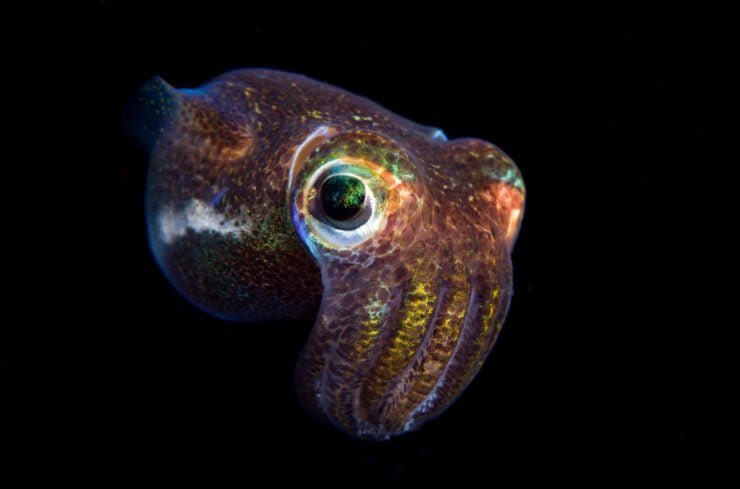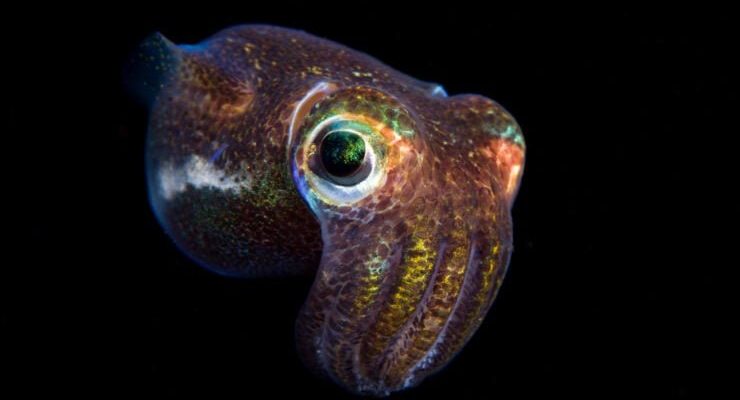
Now, I know what you’re thinking: “What makes squids so special?” Well, prepare yourself, because these creatures have some seriously wild features and behaviors that’ll make you look at them in a whole new light. From their impressive ability to change color to their remarkable intelligence, squids have a lot going on beneath those slick, shiny exteriors. So, grab a cup of coffee, and let’s jump into the ocean of squid knowledge together!
1. Squids Have Three Hearts
Here’s one of the most surprising things about squids: they have three hearts! Yeah, you heard that right. While we humans have one heart pumping blood through our bodies, squids have evolved to have two hearts specifically for pumping blood through their gills, where it gets oxygenated. The third heart pumps the oxygen-rich blood to the rest of their bodies.
Imagine how busy those little hearts must be! This unique system helps squids survive in their underwater habitats, which often lack oxygen. Because of their ability to efficiently circulate blood, squids can dive deep into the ocean where conditions can be pretty harsh. Who knew that squids had such a robust cardio system? It kind of makes our one heart feel a bit lazy in comparison!
2. Masters of Camouflage
If you’ve ever seen a squid in action, you might have noticed their incredible ability to blend into their surroundings. This talent isn’t just for show; it’s a crucial survival skill. Squids use specialized skin cells called chromatophores to change color and even texture in the blink of an eye. It’s like having a magical wardrobe that changes instantly!
When a squid feels threatened or wants to sneak up on prey, it can shift its colors from vibrant blues and reds to soft browns and greens, matching the ocean floor or coral reef around it. Picture a magician pulling off a trick—suddenly, the squid disappears right before your eyes. This skill isn’t just for hiding, though; it also plays a role in communication between squids. Isn’t that fascinating?
3. They Can Be Quite Intelligent
You might think of squids as mere sea creatures, but they actually possess a level of intelligence that’s quite remarkable for invertebrates. Research shows that squids can solve complex problems, navigate mazes, and even exhibit behaviors that suggest they can learn from experience. Think about it: squids have been known to manipulate their environment and use tools, showcasing cognitive skills that rival some mammals!
In fact, their intelligence is often compared to that of octopuses, another clever class of cephalopods. Imagine meeting a squid that’s figured out how to escape from a tank or cleverly use a shell to hide from predators. Their smarts may be one reason they’ve thrived so well in various ocean habitats, adapting to changing conditions and challenges.
4. The Giant Squid Can Grow Up to 43 Feet Long
When it comes to size, squids can blow minds! The giant squid, in particular, is one of the largest marine creatures, reaching lengths of up to 43 feet (about 13 meters). That’s longer than a bus! Despite their massive size, they’re elusive and rarely seen by humans, which adds to their mystique.
Imagine swimming in the ocean and suddenly spotting a giant squid gliding gracefully through the depths. It’s like a scene from a movie! Their long bodies, equipped with arms and large eyes, allow them to be efficient hunters in the deep sea. However, their size isn’t enough to protect them from predators like sperm whales, which are known to hunt giant squids.
5. Squids Have the Ability to Regenerate Arms
Losing a limb can be a nightmare for many creatures, but not for squids! If a squid loses an arm, it has the remarkable ability to regenerate it over time. This capability is beneficial for survival; if they get caught by a predator, they can escape and later grow back their lost limb.
Think of it like a superhero power—one moment they’re in danger, and the next, they’re pulling a Houdini and managing to get away with just a little bit of their anatomy missing. Regeneration can take a few months to a year, depending on the species and conditions, but it’s an impressive trait that highlights their adaptability in the harsh ocean environment.
6. They’re Masters of Ink
Let’s talk about the ever-famous *squid ink*, shall we? When a squid feels threatened, it can release a cloud of ink that creates a visual distraction, allowing it to escape from predators. This ink isn’t just a random substance; it’s made up of melanin (the same pigment that colors human skin) and can also include other compounds that make it effective for evasion.
Just picture a squid in a precarious situation—suddenly, it releases a cloud of ink, turning the water dark and murky. In that chaos, it slips away undetected. This tactic is one of the oldest tricks in the book of survival in the animal kingdom, and it’s fascinating how effective it is.
7. Squids Have Excellent Vision
Did you know that squids have some of the best eyesight among marine creatures? Their eyes are large and complex, allowing them to see well in the dark depths of the ocean where light doesn’t penetrate. In fact, their eyes are often compared to human eyes in terms of structure, but squids can see a broader range of colors.
Imagine having night vision that’s more advanced than a high-tech camera! This visual prowess helps them spot prey and avoid predators effectively. Their keen eyesight means they can detect the slightest movements in the water, giving them an edge in the food chain. It’s pretty wild to think about how these creatures navigate their world!
8. Squid Species Are Diverse
There’s a whole universe of squid species out there—over 300 varieties, in fact! Each species has distinct features and adaptations that suit their specific environments. From the tiny pygmy squid to the enormous giant squid, these creatures show how diverse marine life can be.
For example, the colossal squid, another large species, can weigh as much as half a ton! Others, like the humboldt squid, are known for their aggressive hunting strategies. This diversity means that there’s so much to learn and discover about squids, making them an exciting topic for marine enthusiasts and scientists alike.
9. Some Squids Are Bioluminescent
Bioluminescence is a magical feature found in some sea creatures, and squids are no exception. Certain species have the ability to produce light through biochemical reactions in their bodies. This ability can serve various purposes, from attracting mates to luring prey or even warding off predators.
Imagine swimming through the dark ocean, and a squid suddenly lights up with vibrant colors. It’s like a disco party in the deep sea! This beautiful display doesn’t just look cool; it’s a critical survival mechanism that highlights the wonders of evolution in the ocean’s depths.
10. They Play a Vital Role in Marine Ecosystems
Lastly, squids play a significant role in their ecosystems. They are both predators and prey, making them essential to the food web. As hunters, squids help control the populations of smaller fish and crustaceans, helping maintain balance in marine environments.
On the flip side, they are also a food source for larger predators like sharks, whales, and even birds. Their presence in the ocean supports biodiversity and ensures the health of the ecosystem. Without squids, the intricate web of life in the ocean would look vastly different.
In conclusion, squids are not just quirky sea critters; they are fascinating beings with amazing adaptations, intelligence, and significant ecological roles. From their ability to camouflage to their impressive sizes and skills, these creatures offer endless intrigue. Now that you know a little more about squids, perhaps the next time you see one—whether in a documentary, an aquarium, or on your plate—you’ll have a newfound appreciation for these marvelous marine animals.

